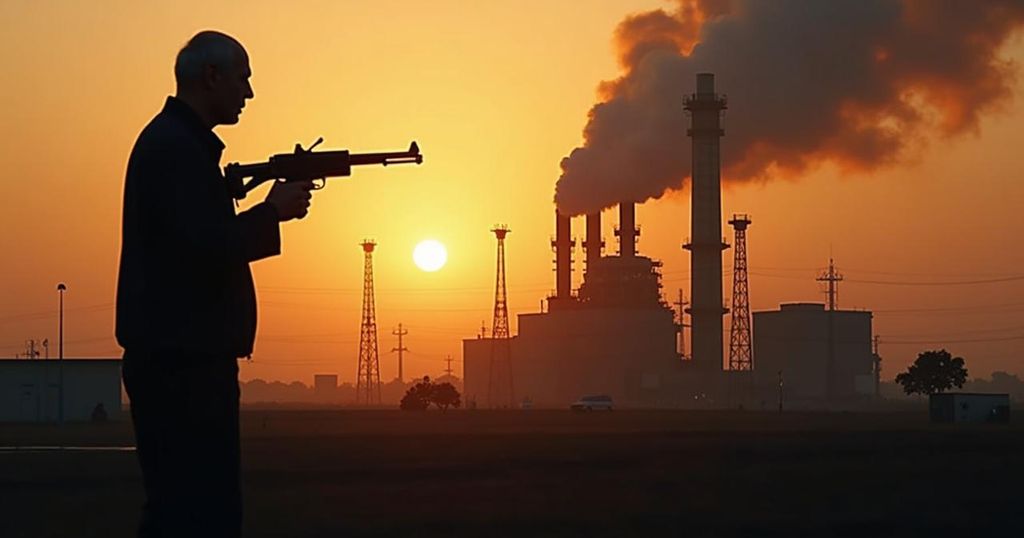President Biden has stated that he would not support an Israeli strike on Iran’s nuclear sites following Iran’s recent missile attacks on Israel. Biden emphasized the need for any Israeli response to be proportional and has reiterated U.S. support for Israel, while warning against escalations that could lead to broader conflicts in the Middle East.
United States President Joe Biden has publicly expressed his opposition to any Israeli military action aimed at Iran’s nuclear sites in response to recent missile strikes from Tehran. In a statement made during a press interaction, Biden firmly stated, “the answer is no” when questioned about his potential support for such strikes. This pronouncement comes in the wake of Iran’s launch of approximately 180 ballistic missiles targeting Israel, marking a significant escalation in tensions between the two nations. Despite the provocative nature of the attack, which was Iran’s second missile offensive since April, Israeli Prime Minister Benjamin Netanyahu has vowed that Iran will incur consequences for its actions. Although the missile barrage reportedly resulted in no substantial casualties in Israel, it did claim the life of a Palestinian in the occupied West Bank. Analysts have raised concerns that this recent series of events may prompt Israel to undertake military action against Iran’s nuclear facilities—a target long sought by Israeli leadership. Ali Vaez, the Iran Project director at the International Crisis Group, cautioned that the likelihood of an Israeli strike on Iran’s nuclear program has increased significantly. He pointed out that Iran’s defensive ally, Hezbollah, is currently weakened, presenting what could be viewed as a unique opportunity for Israel to address a security threat that it has perceived for decades. Former Israeli Prime Minister Naftali Bennett also advocated for immediate action against Iran’s nuclear capabilities, stating on social media that Israel possesses both the justification and the tools necessary to execute such an attack. In response to these developments, President Biden has urged for any retaliatory actions from Israel to be measured and “proportional.” This sentiment aligns with the stance of other G7 nations, which includes Canada, France, Germany, Italy, Japan, and the United Kingdom. Additionally, Biden has characterized the United States as being “fully supportive of Israel,” while also signaling potential new sanctions against Iran in coordination with G7 leaders. The backdrop of these tensions includes Iran’s assertion that its missile barrage was a direct retribution for the killing of key figures aligned with Iran, including Hamas leadership. Iranian President Masoud Pezeshkian noted that, while the attack was justified, Tehran does not seek a direct conflict with Israel. In the face of these escalating hostilities, political analyst Marwan Bishara has warned that a confrontation between Iran and Israel, particularly involving the United States, could have dire consequences for the entire Middle East and beyond. As the situation unfolds, it remains to be seen how both nations will navigate these heightened tensions amid ongoing conflicts in Gaza and Lebanon.
The conflict between Iran and Israel is deeply rooted in historical animosities and geopolitical dynamics in the Middle East. Recent missile exchanges have escalated tensions further, with Iran carrying out attacks it claims are retaliatory. The United States, under President Biden’s administration, plays a crucial mediating role, advocating for restraint and proportional responses, while also supporting Israel’s right to defend itself amidst threats from Iran. The situation is further complicated by the involvement of various regional actors and allies who may influence the dynamics of conflict and diplomacy in this volatile region.
In summary, President Biden’s stance against an Israeli strike on Iran’s nuclear sites highlights a commitment to de-escalation and proportionality amidst escalating tensions following Iran’s missile attacks. Both nations find themselves in a precarious position, where military actions could lead to broader conflicts, emphasizing the critical need for diplomatic interventions and coordinated responses from global powers. As the stability of the region hangs in the balance, careful navigation of these relationships is essential to preventing further violence.
Original Source: www.aljazeera.com







